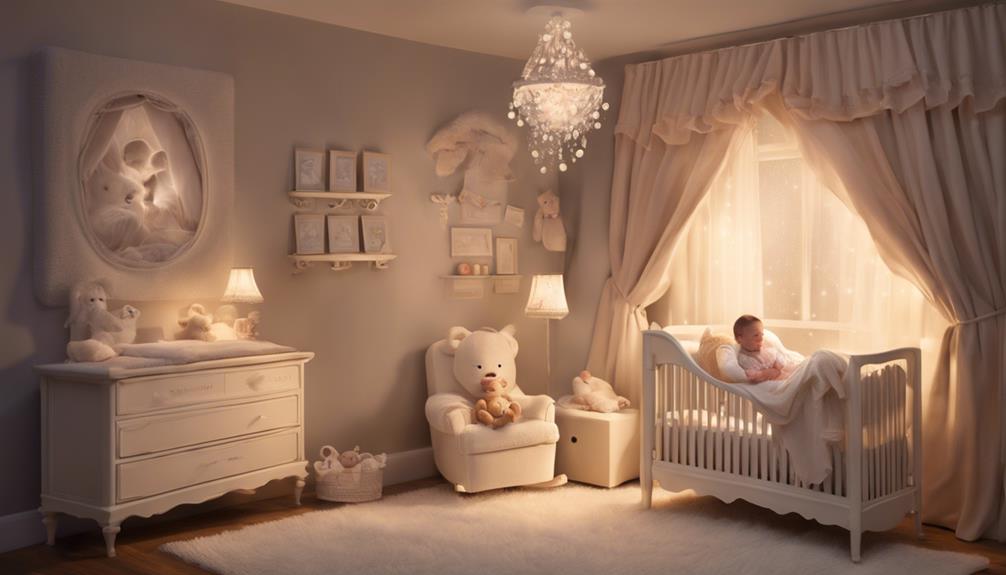As parents, it is understood that approximately 20% of newborns experience night-time crying episodes. When our little ones scream during sleep, it can be distressing and leave us feeling helpless.
But fear not, there are gentle and effective ways to calm your newborn and help them drift back into peaceful slumber. From creating a soothing sleep environment to understanding common reasons for crying, we will explore practical strategies to comfort your baby and promote restful nights for the whole family.
Key Takeaways
- Recognize newborn sleep cycles to respond effectively to cries.
- Create a soothing sleep environment with swaddling and white noise.
- Implement gentle soothing techniques like rocking and pacifiers.
- Seek support from professionals for persistent crying issues.
Understanding Newborn Sleep Cycles
As new parents, understanding newborn sleep cycles is essential for ensuring your baby gets the rest they need for healthy development. Newborns have shorter sleep cycles, typically lasting 50-60 minutes, moving through REM and non-REM sleep stages.
REM sleep is particularly important for their brain development, helping process new information effectively. Unlike adults, newborns spend around 50% of their sleep in REM sleep, highlighting its significance.
By grasping these sleep patterns, we can better respond to our newborn's sleep needs. When your baby screams during sleep, it might be their way of expressing discomfort or needing attention. Understanding their sleep cycles can guide us in calming them effectively, ensuring they feel secure and content.
Creating a Soothing Sleep Environment

Maintaining a consistent and calming bedtime routine is key to signaling to your baby that it's time to sleep. To create a soothing sleep environment for your newborn, consider the following:
- Guaranteeing or Sleep Sack: Wrapping your baby snugly in a swaddle or using a sleep sack can provide a sense of security and help prevent the startle reflex from waking them during sleep.
- White Noise Machine or Gentle Lullabies: Using a white noise machine or playing gentle lullabies can mask disruptive sounds and create a calming atmosphere that promotes better sleep for your little one.
- Safe Sleep Recommendations: Guarantee your baby's crib or bassinet adheres to safe sleep recommendations to reduce the risk of Sudden Infant Death Syndrome (SIDS). Keep the sleep environment dark, quiet, and at a comfortable temperature to help your newborn rest peacefully.
Implementing Gentle Soothing Techniques

To help your newborn settle down for sleep, incorporating gentle soothing techniques can be incredibly beneficial. When your little one is crying during sleep, gentle rocking, swaying, or patting can work wonders in calming them down. Utilizing white noise machines or soft lullabies can create a peaceful environment conducive to sleep. Offering a pacifier or allowing them to suckle for comfort can provide the soothing they need to drift back into slumber.
Establishing a consistent and soothing bedtime routine helps newborns feel secure and relaxed, setting the stage for better sleep patterns. Remember to avoid overstimulation and bright lights when comforting a crying newborn during slumber to facilitate a smooth change back to rest. By implementing these gentle techniques, you can help your newborn feel comforted, calm, and ready for a peaceful night's sleep.
Addressing Common Reasons for Crying

When your newborn is crying during sleep, understanding and addressing the common reasons behind their tears can help you provide the right comfort and support they need. Here are some common reasons why babies cry during sleep:
- Rapid Eye Movement (REM) Sleep: Babies may cry during REM sleep, which is a normal part of their sleep cycle. This phase can sometimes be accompanied by movements and sounds that may startle them.
- Teething Pain: Teething can cause discomfort for babies, leading to crying episodes during sleep. Providing gentle teething remedies or soothing techniques can help alleviate their pain.
- Shifting Between Sleep Cycles: Crying in sleep can occur when babies shift between different sleep cycles. This temporary distress is normal and may reduce as they adjust to their sleep patterns.
Understanding these common reasons for crying during sleep can help you respond effectively, providing comfort and reassurance to your little one. Remember, it's all part of their development and offering a calming presence can make a significant difference.
Seeking Support and Professional Help

If you find yourself overwhelmed by your newborn's persistent nighttime crying, reaching out for support and professional help can provide valuable guidance and reassurance. Joining local parenting groups or online forums can connect you with other parents who may have experienced similar challenges and can offer practical advice on soothing techniques.
If your baby's nighttime crying continues or greatly affects their well-being, consulting a pediatrician or healthcare provider is vital to rule out any underlying medical issues. For breastfeeding mothers, seeking guidance from a lactation consultant can help incorporate feeding routines into your soothing strategies.
Additionally, reaching out to a sleep specialist or counselor can provide expert insights and support in understanding and managing your newborn's nighttime crying patterns. Consider attending parenting classes or workshops to learn effective techniques and gain confidence in calming your baby's cries during sleep.
Frequently Asked Questions
Why Does My Baby Scream Hysterically in His Sleep?
I sympathize with how distressing it is when our baby screams in their sleep. Night terrors, common in older children, might be the cause. Consulting a healthcare provider can provide insights and strategies for managing these episodes effectively.
What to Do When Baby Screams in Sleep?
When baby screams in sleep, we gently comfort, check safety, and observe patterns. Creating a calming environment aids in soothing them back to rest. Patterns guide understanding, ensuring appropriate responses to their needs.
How Do You Calm a Hysterical Baby at Night?
When our baby is hysterical at night, we check basic needs first. Then, we soothe with gentle rocking, soft singing, or patting. Keeping a calm, quiet environment helps. White noise or soft music can create a soothing atmosphere.
Why Does My Baby Scream in Deep Sleep?
We've noticed our baby screaming in deep sleep; it could be night terrors, common in older children. These episodes happen during deep sleep phases, causing crying or screaming without full awareness. Ensuring their safety is important.
Conclusion
As we navigate the world of newborn sleep, remember that we're the gentle guides in the dark night. Like a lighthouse guiding ships safely to shore, we soothe our little ones with love and patience.
By creating a peaceful sleep sanctuary and using calming techniques, we can help our babies find their way back to dreamland.
Remember, we're the calming presence in the storm, guiding our babies to peaceful slumber.









